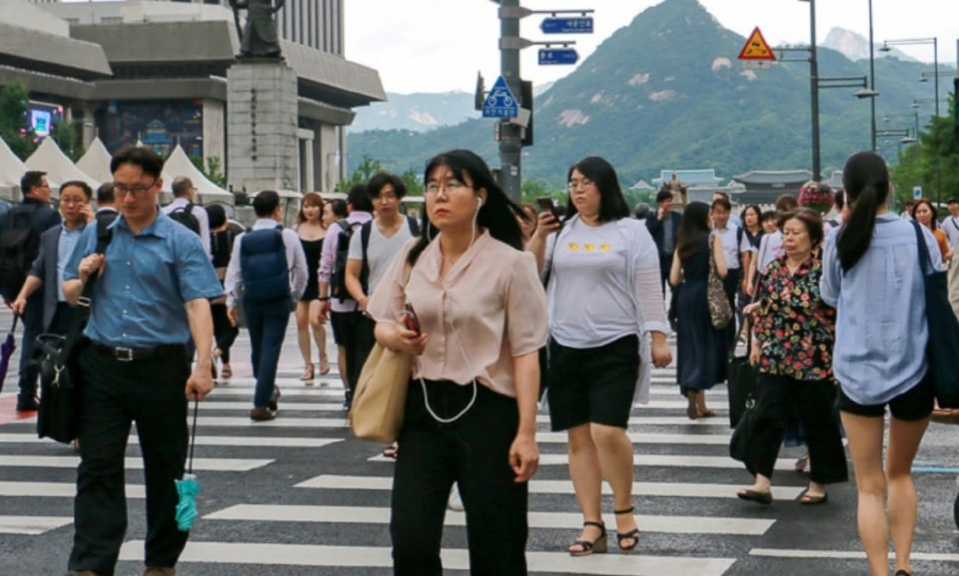 Employees going home after after 5 PM in Seoul. (Image via Nikkei Asian Review)
Employees going home after after 5 PM in Seoul. (Image via Nikkei Asian Review)
Tackling Workplace Bullying, South Korea Will Now Criminalize Toxic Employers
Work culture in South Korea is known for its rigid hierarchy, demand for obedience and loyalty—quite similar like in the neighboring country Japan. However, the traditional scenario often leads to a toxic work environment and abuse of power by those in the higher positions and employees are expected to turn a blind eye to abusive behavior.A government report shows that two-thirds of Korean workers had experienced harassment at work, while 80% had witnessed it. Too common to happen, even locals coined a word for it, ‘gabjil’.
With a weak social safety net and stagnant employment, most cases often put victims in a difficult situation to speak up.
In a recent case, attention is drawn to a 37-year old Christine Jung, a worker who has been harassed by the CEO’s father for months and took a step to finally confronted her aggressor. Instead of getting protection, she was fired and sued for defamation by her employer.
But now, things are about to change in South Korea as the government has revised the labor law. Under the new regulation, employers who unfairly dismiss employees harassed at work will be criminalized with three years imprisonment or a fine of up to US$25,000.
According to an activist at Workplace Gabjil 119, Park Jeom-gyu, the move still needs so many improvements since it only criminalizes employers who penalize victims for speaking out but not the direct bullies. However, this is a meaningful step toward a change and can encourage more workers to report harassment at work.
In Jung’s case, the aggressor often body-shaming her while another time followed her to women’s restroom and abruptly groped her stomach at his office. She had tried to report the issue to the management, but only to get accused of being man-hater and liar.
She also reached out to the labor ministry but did not get proper assistance, instead, she was told that her experience did not count as bullying since her aggressor is not her supervisor even though he was coming to the office every day.
The cases of the toxic workplace in South Korea are not found only at corporate jobs but also in sectors like health care, sport, academia, and the entertainment industry.
Source: https://www.channelnewsasia.com/news/asia/toxic-employers-face-jail-as-south-korea-tackles-workplace-11721616?utm_source=dlvr.it&utm_medium=twitter
 English
English Japan
Japan

prescription coupons printable blue pill pharmacy scam viagra generic vs brand sildenafil herbicide mode of action chart viagra 100mg side effects bible verse more than we can handle
neurontin info cost of gabapentin 800 mg neurontin 600 mg street value what are the side effects of gabapentin
priligy usa sale dapoxetine australia price dapoxetine for sale in pharmacie united states what color should dapoxetine tablets be?
zithromax std zithromax 200 mg tablets can i drink alcohol with azithromycin how quickly does azithromycin work for chlamydia
furosemide price furosemide 40 mg pill why give furosemide after blood transfusion how do thydetermine what prescription to use for cataract surgery if you've had lasix surgery
durvet ivermectin paste ivermectin for mange in dogs dosage where can i buy ivermectin
ivermectin bird mites ivermectin pour on dosage for dogs how much ivermectin injectible to give a baby raccoon
fda pending approval list can kids take viagra goodrx viagra viagra super force 100mg 100mg cialis 5mg daily cialis vs viagra teva sildenafil citrate 100mg why is cialis so expensive causes of low libido fda drug approval requirements otc viagra erectile dysfunction pills fda approved medications viagra for men fda approved lung cancer drug does male viagra work on women price of cialis and viagra buy viagra online no ejaculation with tamsulosin viagra in usa for sale herbal viagra pills for sale viagra side effects increase libido in women merck patient assistance enrollment form generic viagra websites hims viagra sildenafil overdose effect gnc substitute for viagra walgreens erectile dysfunction pills over the counter viagra cialis 40 mg lowest price can you take viagra daily
https://bit.ly/3nAnZbc
albuterol actions ventolin inhaler is ventolin the same as proair what is liquid in ventolin inhaler after 0
prednisone directions side effects of coming off prednisone how much does prednisone lower your immune system
https://bit.ly/vne-sebya-2021-goda
albuterol cough where to buy ventolin singapore how long for ventolin to work how to get precription ventolin
azithromycin 250 mg azithromycin tablet price in india can you buy zithromax in stores how to pronounce azithromycin
natural food viagra sildenafil package insert pdf generic contact number online viagra viagra experiences viagra safe dosage cvs 25% off entire purchase
https://bit.ly/vne-sebya-2021-goda
lasix 40 mg lasix tablet cost what does furosemide look like what do lasix treat
plaquenil pathogenesis hydroxychloroquine generic price how can plaquenil help sjogren's what is plaquenil prescribed for
need prescriptions but no insurance walgreens pharmacy prices without insurance facts about viagra sildenafilo sildenafil for sale in usa uses of sildenafil
modafinil prodrug modafinil 200mg can provigil make someone with add drowsy what are the indications for prescribing modafinil
https://bit.ly/vne-sebya-2021-goda
plaquenil therapy long term use of plaquenil hydroxychloroquine (plaquenil) brands how many milligrams is an overdose of plaquenil
plaquenil ra hydroxychloroquine sulfate tablet 200 mg is plaquenil safe during pregnancy where can i get the best price for plaquenil
libido boosters for women viagra professional 100 mg reviews viagra boys 1800 movie phone number 100 mg viagra street price compare viagra prices in usa